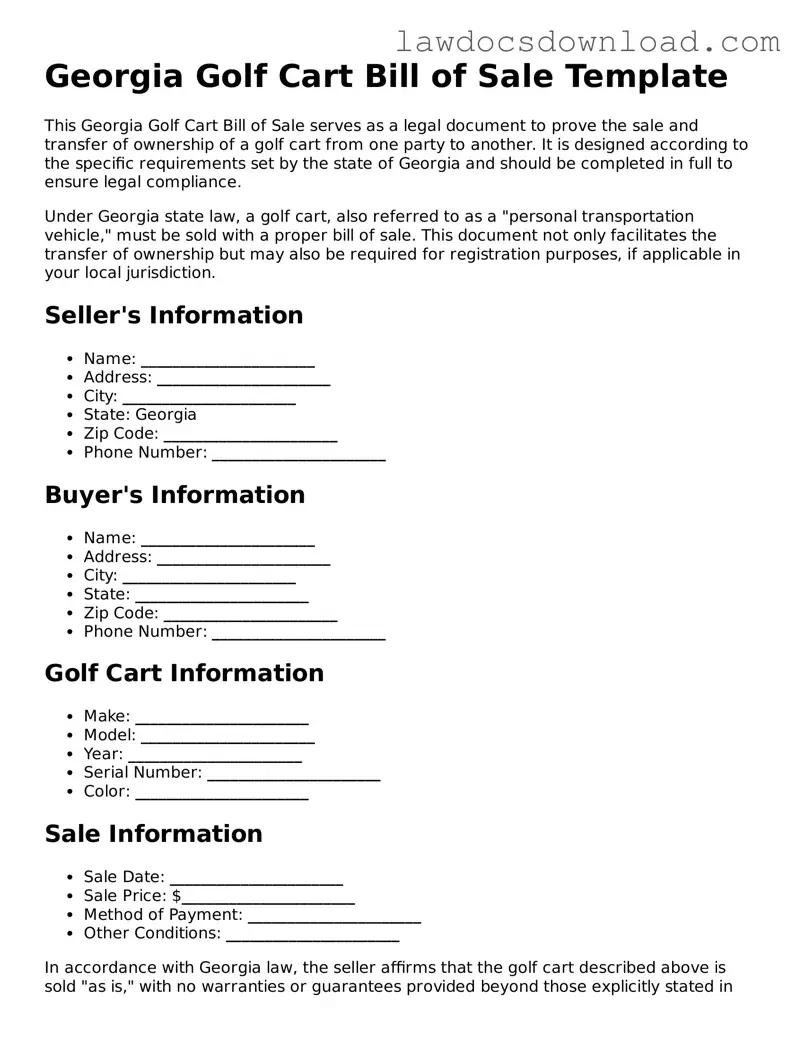One common mistake individuals make when filling out the Georgia Golf Cart Bill of Sale form is neglecting to verify the accuracy of the buyer and seller's personal information. This includes full names, addresses, and contact details. Precision in this area is crucial; errors can create legal challenges, especially if disputes arise or if the document needs to be used in official capacities, such as for registration purposes.
Another error frequently made is failing to include a detailed description of the golf cart. A comprehensive description should encompass make, model, year, color, identification numbers, and any unique features or modifications. This level of detail ensures both parties are clear about what is being bought and sold, and helps to prevent any misunderstandings or misrepresentations about the condition or specifics of the golf cart.
Overlooking the need to elucidate the sale conditions is also a common misstep. Whether the golf cart is being sold "as is" or with certain guarantees or warranties, stating this explicitly within the document is pivotal. Neglecting to explicitly state the sale conditions can lead to disputes about the golf cart's condition after the sale, potentially leading to legal complications and dissatisfaction between parties.
Omitting the date of the sale is another oversight often made. The sale date is significant because it can affect the ownership transfer process and might also be relevant for tax purposes. Without a clear sale date, establishing the ownership timeline can become unnecessarily complex.
Not specifying the payment details and terms within the Bill of Sale is a mistake that can lead to ambiguity regarding the financial aspects of the transaction. Including the sale price, payment method (cash, check, etc.), and payment schedule (if applicable) helps both parties understand their financial obligations and rights clearly.
A crucial component that is sometimes missed is the signatures of both parties. The buyer's and seller's signatures, along with the date of signing, are mandatory for the document to be considered legally binding. Without these signatures, the document's enforceability can be questioned, and it may be deemed invalid in a legal setting.
Another error involves not acknowledging or improperly handling any liens against the golf cart. If there are existing liens, these should be clearly disclosed within the bill of sale, including how these liens will be satisfied. Failure to do so can result in legal and financial issues for the buyer, who may become responsible for these encumbrances.
Individuals often forget the necessity of having witnesses or a notary acknowledge the signing of the document. While not always legally required, having a third-party witness or notarize the document can add an extra layer of legality and credibility, especially in the event of a dispute or challenge to the document's authenticity.
Last but not least, retaining copies of the completed Georgia Golf Cart Bill of Sale is a step frequently overlooked. Both the buyer and seller should keep copies of the fully executed document for their records. These copies can be vital for future reference, such as for tax reporting, ownership verification, or resolving any post-sale disputes. Failing to keep a copy can result in unnecessary complications and confusion in these situations.

